Sanctuary cities could get boost from sports betting ruling

In President Donald Trump’s former life as a casino owner, he might have cheered Monday’s ruling from the Supreme Court that struck down a federal law that barred every state but Nevada from allowing betting on most sporting events. But the Trump administration opposed the outcome reached by the high court at least in part because it could signal trouble in its legal fight against so-called sanctuary states and cities. Seven of the nine justices — five conservatives and two liberals — backed a robust reading of the Constitution’s 10th Amendment and a limit on the federal government’s power to force the states go along with Washington’s wishes. The federal anti-gambling law is unconstitutional because “it unequivocally dictates what a state legislature may and may not do,” Justice Samuel Alito wrote in his majority opinion. “It’s as if federal officers were installed in state legislative chambers and were armed with the authority to stop legislators from voting on any offending proposals.” There is a direct link between the court’s decision in the sports betting case and the administration’s effort to punish local governments that resist Trump’s immigration enforcement policies, several legal commentators said. “The court ruled definitively that the federal government can’t force states to enforce federal law. In the immigration context, this means it can’t require state or local officials to cooperate with federal immigration authorities,” said Ilya Shapiro, a senior fellow in constitutional studies at the libertarian Cato Institute. Omar Jadwat, director of the ACLU’s immigrants’ rights project, said the ruling reinforced decisions from the 1990s, including one that struck down part of a federal gun control law that required local police to determine if buyers were fit to own handguns. “It reiterates that the real thrust of the 10th Amendment and the principles of law in this area is that the fed government can’t tell the states or cities how to legislate,” Jadwat said. The amendment says that powers not specifically given to the federal government belong to the states. The gun law decision split the court’s conservatives and liberals in 1997, in keeping with conservatives’ complaints about the federal government’s overreach and the importance of states’ rights. But on Monday, Justices Stephen Breyer and Elena Kagan joined their more conservative colleagues. The Justice Department declined to comment on the decision, but it had called on the court to uphold the federal law at issue — the department’s usual practice when federal laws are challenged — by arguing that there was no constitutional violation. In the most recent ruling about sanctuary cities, the federal appeals court in Chicago held last month that the federal government cannot withhold public safety grants from cities that won’t go along with Trump’s immigration enforcement policies. In lawsuits challenging the administration, cities argue that turning local police authorities into immigration officers erodes trust with minority communities and discourages residents from reporting crime. The administration says sanctuary jurisdictions allow dangerous criminals back on the street. The administration’s efforts to crack down on places that don’t comply with immigration authorities have taken several forms. Trump issued an executive order aimed at withholding federal money from recalcitrant jurisdictions. The administration also has sued California over three laws aimed at protecting immigrants in the country illegally. Republished with permission from the Associated Press.
Will Ainsworth: Illegal immigration is an epidemic that demands a cure

Imagine for a moment that while you and your family sleep, another family breaks into your home and moves into your basement in the dark of night. Once you discover them, you call the authorities to have them removed but are told that because they have established residency, it would be wrong for you to force them to leave. Or, even worse, the authorities openly acknowledge the law has been broken but inform you that your elected officials have ordered them not to cooperate. Certainly you and your family would feel violated, helpless, and angry at the absurdity of the arguments and the immorality of the situation. A similar scenario is happening in the United States thousands of times each week, except instead of breaking into your homes, illegal immigrants are breaking our borders and violating our laws with their very presence. Illegal immigration is an epidemic that has gone untreated for far too long, and it is one that drains billions of taxpayer dollars as we are forced to provide unearned government services to those who do not pay a dime of taxes back into the system. Allowing a subculture of an estimated 12.5 million illegal immigrants to live off the grid and under the radar hurts our nation’s economy, drains our jobs, increases our crime rates, and threatens our homeland security. It also insults those honorable immigrants who have taken the time, effort, and financial commitment to follow our laws and move here legally. An estimated 65,000 illegal immigrants currently reside in Alabama, which is down from a previous approximation of 80,000 thanks in large part to the toughest-in-the-nation immigration law that the Republican Legislature approved in 2010. Unfortunately, liberal judges and activist federal courts have neutered and rejected the most effective portions of the state law that protected our sovereign borders, so the number of illegals in Alabama is likely to rise again. During my one term in the Alabama House, I have strongly supported every measure before the body that seeks to seal our porous borders, enforce the immigration laws on the books, and discourage illegal immigrants from planting their roots in our communities. Among those measures was a resolution that urges Congress to fund and expedite the construction of a secure wall across the border between the United States and Mexico, which continues to be a cornerstone priority of President Donald Trump’s administration. Statistics show that nearly 1,000 aliens are caught and captured each day while trying to illegally cross the Mexican border, but it a significant number of aliens successfully avoid detection and capture. An impenetrable border wall is an absolute necessity, and I am proud that an Alabama-based construction company is among a handful that is under consideration to build the edifice for the Customs and Border Protection Agency. I also stood tall for proposed legislation that would withhold state funding from any cities, counties, or public colleges and universities that defy immigration laws and declare themselves “sanctuary” areas that harbor illegal aliens. The bill was a proactive step to protect Alabamians before any city or campus in our state takes action that would help harbor illegal aliens and block the enforcement of immigration laws. The Legislature adjourned before the measure could be enacted, but I plan to use the bully pulpit of the lieutenant governor’s office to push for its reintroduction and rally the public to insist upon its passage. If the federal bureaucracy, the liberal Democrat opposition in Congress, and the career politicians who sell their votes to special interests refuse to properly protect our nation’s borders, I believe the responsibility to protect Alabama’s borders must fall upon the shoulders of state leaders. It is a responsibility that I, for one, am not only willing to shoulder, I am eager to shoulder it. ••• Guntersville-Republican State Rep. Will Ainsworth is a candidate for lieutenant governor. Elected to the Legislature in 2014, Ainsworth currently represents Alabama’s House District 27, which includes portions of Marshall, DeKalb, and Blount counties.
California county considers fighting state’s ‘sanctuary’ law
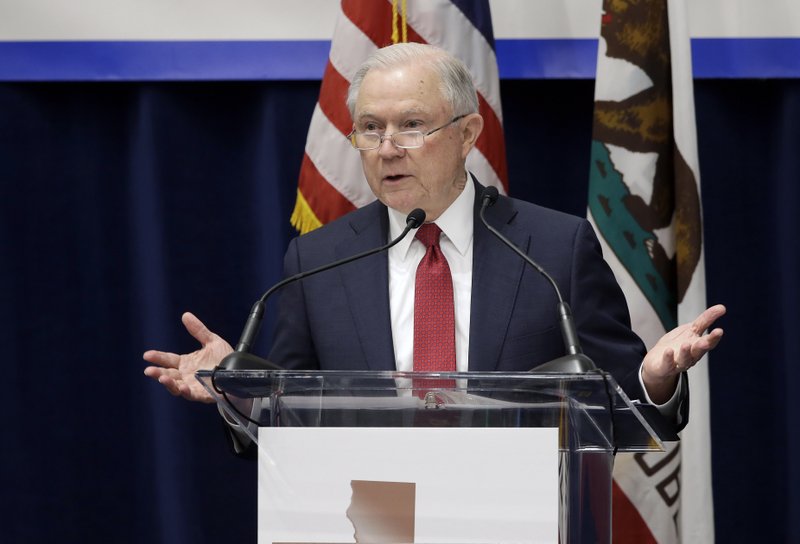
Leaders of Orange County, California, planned Tuesday to consider fighting a state law aimed at protecting immigrants from stepped-up deportations under the Trump administration. The backlash to the state’s so-called sanctuary law comes a week after the small city of Los Alamitos in Orange County voted to opt out of the policy. The all-Republican supervisors of the Southern California county of 3.2 million people were expected to discuss passing a resolution in support of Los Alamitos and whether to join the U.S. government’s lawsuit over the law, which bars police in many cases from turning over suspects to federal immigration agents for deportation. “This legislation prevents law enforcement from removing criminals from our community and is a threat to public safety,” said Supervisor Shawn Nelson, who has proposed joining the lawsuit by President Donald Trump’s administration or filing a new one. Orange County, which is home to Disneyland and wealthy beach communities where many people vacation, has a five-member board of supervisors, and all are Republican. While Republicans still outnumber Democrats in the county, Democrats have gained significant ground in recent years, and Hillary Clinton won more votes than Trump in Orange County in the 2016 presidential election. California, a liberal state that is home to more than 10 million immigrants, passed its sanctuary law last year to limit local police collaboration with U.S. immigration authorities. Supporters argue that the measure would encourage immigrants to report crime without fearing deportation, while critics say local police should provide more assistance to federal authorities. Officials in Los Alamitos, a community of about 12,000 people 20 miles (32 kilometers) southeast of downtown Los Angeles, raised constitutional concerns about the law and sent letters to other cities seeking their support. Legal experts and immigrant advocates have said cities can’t simply opt out of state law and will face lawsuits if they try. Sameer Ahmed, a staff attorney at the American Civil Liberties Union of Southern California, said some cities appear to be discussing largely political resolutions, not local laws like Los Alamitos. But the idea that Orange County would consider taking such a stand is concerning to immigrant advocates, he said. “We definitely think it is wrong, and offensive as well, that these cities and the county are saying they would rather further the anti-immigrant agenda of the Trump administration than protect the rights of their own immigrant residents,” he said. Republished with the permission of the Associated Press.
Mike Rogers: Putting Americans first

America may be a country of immigrants, but it’s also a country of laws. No one is exempt from those laws regardless of what some local officials in sanctuary cities may think. As you may have seen on the news recently, Attorney General Jeff Sessions recently announced a lawsuit against the State of California for failure to completely cooperate with federal immigration enforcement officers. I stand with AG Sessions’ decision. From the mayors and local politicians disregarding federal immigration law to the illegal immigrants they are prioritizing over American citizens, it’s about time we hold these lawless individuals accountable. The “leaders” in these cities are violating their oath of office and the Constitution. They should be immediately removed from their positions and the illegal immigrants they are protecting should be deported. Period. I agree with President Donald Trump that we need to strengthen our borders. We should build the wall and we should continue to support law enforcement’s crackdown on violent foreign gangs like MS-13. These efforts mean nothing though if illegal immigrants and criminals can continue to seek refuge in some of our country’s largest cities. It boils down to fairness, safety and what it means to be a sovereign nation. A country without borders is hardly a country at all. I’m fed up with seeing the tax dollars from hard-working families across East Alabama go to cities who snub their nose at the very ideals that make America great. Congress should withhold funding from sanctuary cities that refuse to uphold federal law. President Trump has proven his tough stance on illegal immigration is much more than just campaign rhetoric. He has already done so much to curtail our illegal immigration crisis but he can’t do it alone. Elected officials – from the state and local level to Members of Congress – must do their part. And if they refuse, then they aren’t fit for public service. ••• Mike Rogers is a member of U.S. Congress representing Alabama’s 3rd Congressional District. Sign-up for his e-Newsletter by visiting www.mikerogers.house.gov. To stay up to date, you can also like him on Facebook at Congressman Mike D. Rogers, follow him on Twitter, Pinterest and Instagram at RepMikeRogersAL, on Tumblr at www.repmikerogersal.tumblr.com.
Alabama reacts to Jeff Sessions actions against sanctuary cities
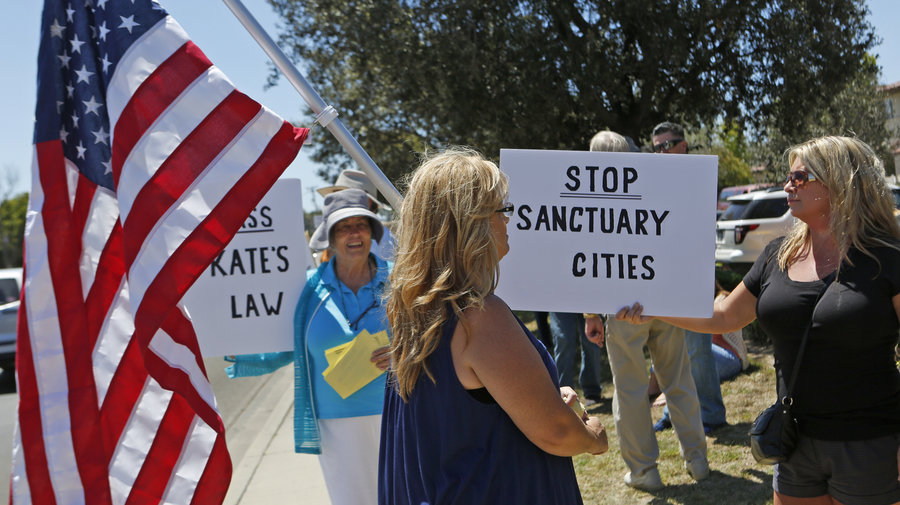
On Wednesday, Attorney General Jeff Sessions announced an official lawsuit against the state of California over its sanctuary city policies. The lawsuit argues that the state of California is violating the U.S. Constitution by maintaining its laws and policies that prohibit the federal government from enforcing immigration laws and punishing illegal immigrants who commit crimes. “I’m afraid this is an embarrassment to the proud state of California,” Sessions said during a news conference announcing the lawsuit. Here are the reactions from Alabama politicians: Alabama 1st District U.S. Rep. Bradley Byrne (via Facebook:) Glad to see Attorney General Sessions and President Trump going tough against sanctuary cities. It is absurd that cities are allowed to blatantly ignore our nation’s immigration laws. There must be consequences for these reckless and dangerous actions Alabama 2nd District U.S. Rep. Martha Roby in a statement: I have consistently advocated against dangerous sanctuary laws like those seen in California, and I am proud that we now have leadership at the Department of Justice that is committed to fighting these reckless policies instead of rewarding them and turning a blind eye. Attorney General Jeff Sessions’ has made the right decision to put California on notice. I firmly believe this action is an important step toward cracking down on sanctuary cities that endanger the American people and violate our nation’s laws. Alabama 3rd District U.S. Rep. Mike Rogers (via twitter:) I agree, AG Sessions, this is completely unacceptable. https://t.co/tondT0ZXsD — Mike Rogers (@RepMikeRogersAL) March 7, 2018
Alabama joins 11-state coalition in legal fight against sanctuary cities
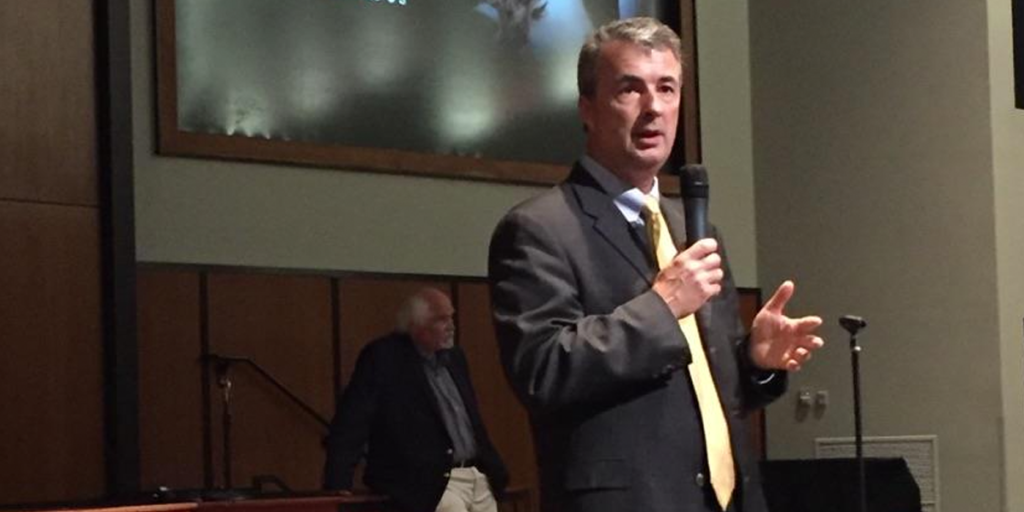
A coalition of 11 states, including Alabama, is urging a federal appeals court to enforce President Donald Trump‘s executive order that punishes sanctuary cities that prohibit cooperation between local law enforcement and federal immigration officials. Alabama Attorney General Steve Marshall made the announcement on Friday that Alabama joined in a friend-of-the-court brief on December 22 urging the U.S. Court of Appeals for the Ninth Circuit to overturn a lower court ruling and to enforce President Trump’s executive order opposing sanctuary cities. The brief argues the establishment of sanctuary cities would undermine the President’s immigration enforcement authority, an area where the Constitution gives him and Congress considerable power. The brief supports President’ Trump’s position in an appeal of the cases City and County of San Francisco v. Donald Trump and County of Santa Clara v. Donald Trump. “This is fundamentally a matter of public safety, in which we are asking the Court to uphold the right of Alabama and other states to fight practices that defy the rule of law and hinder the ability of law enforcement to effectively protect the public,” said Marshall. “If local entities are allowed to interfere with the enforcement of federal immigration laws, then criminal illegal immigrants may take refuge and endanger the surrounding communities. The State of Alabama supports the President’s executive order because we believe that individual states should have the right to prohibit sanctuary cities and effectively protect our citizens.” Sanctuary jurisdictions — cities and localities that prohibit or otherwise obstruct cooperation between federal and local officials on immigration enforcement — defy the rule of law and deprive law enforcement of the tools necessary for effective civil and criminal enforcement, the attorneys general assert. Upholding federal immigration laws will provide law enforcement in Alabama and other states with additional and necessary tools to identify drug offenders who enter the country unlawfully. The executive order directs the U.S. Attorney General and the Secretary of the Department of Homeland Security to ensure that sanctuary cities, to the extent permitted by law, may not receive grant dollars from specific federal programs. The order encourages states to comply with existing federal law that promotes voluntary cooperation between federal and state officials. Alabama joined the West Virginia and Louisiana-led brief with Arkansas, Florida, Kansas, Nevada, Ohio, Oklahoma, South Carolina and Texas. You may access a copy of the brief through this link.
Steve Marshall announces support for state laws banning sanctuary cities

Alabama Attorney General Steve Marshall says he is supporting states’ rights to prohibit sanctuary cities. Marshall joined a coalition of eight state attorneys general in supporting state laws banning sanctuary cities. On Tuesday, Alabama signed onto a multi-state amicus brief siding with Texas as it appeals a federal court ruling blocking the state’s sanctuary cities ban. “When local officials deliberately choose to ignore the law and thereby place their citizens at risk, the result is a breakdown in the rule of law,” said Marshall. “This is precisely what we are witnessing with sanctuary cities and localities which prohibit or impede cooperation between federal and local officials on immigration enforcement. Alabama supports Texas’ sanctuary cities ban because we believe individual states should have the right to prohibit sanctuary cities within their borders.” The eight-state amicus brief opposes a federal court injunction of Texas’s ban on sanctuary cities. Texas law requires local entities and officials to not interfere with federal immigration enforcement. It also places duties and liabilities on certain persons in the criminal justice system, provides civil penalties and creates a criminal offense for violating those provisions. In June, Alabama was also one of ten states defending President Trump’s executive order that directs the federal government to take lawful actions to ensure compliance with laws prohibiting sanctuary cities. Alabama filed the brief with along with Arkansas, Georgia, Louisiana, Missouri, Oklahoma, South Carolina and West Virginia in the U.S. Fifth Circuit Court of Appeals Tuesday evening.
Luther Strange proposes using federal funds to sanctuary cities to pay for border wall

U.S. Sen. Luther Strange is proposing to take federal funding that would go to so-called “sanctuary cities” – those that are not following U.S. immigration law – and use it for President Donald Trump’s promised wall on the country’s southern border. “How many innocent American lives must be lost before security becomes the first priority of immigration?” the Alabama Republican told an audience at a Heritage Foundation event last week. “How many criminal aliens have to be released shy of justice being served for the rule of law to be affirmed as the first priority of a functioning society?” In May, Strange introduced a bill that would keep federal funds going to sanctuary cities that fail to comply with Justice Department directives on immigration law or prevent money going to municipalities that retaliate against small businesses for submitting bids in the construction process for Trump’s border wall. As reported in the Daily Signal, Strange spoke at the event, titled “Securing the Border and Protecting Our Communities,” saying: “My bill has two simple outcomes. Sanctuary jurisdictions can either follow the law or fund the wall. Failure to comply with federal immigration authorities and continued efforts to interfere with the lawful pursuit of border wall contracts by local businesses will be met with the loss of federal transportation and infrastructure grant funding. These funds will go toward the construction of our border wall.” Strange explained that the legislation would be a fiscally conservative way to pay for Trump’s border wall. “I want to be clear about that, these are not funds to pay for emergency preparedness, health care, or public safety,” Strange added. “They are transportation and infrastructure funds, and they will be going to fund a major infrastructure project.” Luther did not give a timetable for construction of the wall but acknowledged the project is still Trump’s top priority. “I have not heard anything except the president say publicly and personally that he’s going to build the wall,” Strange told the crowd. “People in Alabama have certainly not forgotten that promise, and it is a critical commitment to our people.” Strange called for the rule of law to prevail in U.S. immigration policy. “The fact that citizens and others who are here lawfully might be harmed by an unlawful measure picking winners and losers in the name of illegal immigration is the height of irony and liberal hypocrisy,” he said.
Luther Strange launches ad supporting Donald Trump’s legislative agenda

Less than 24 hours after the Supreme Court reinstated President Donald Trump‘s travel ban — which Trump claims is needed to prevent terrorist attacks and help curtail illegal immigration — Sen. Luther Strange on Tuesday released of his third television ad for the Republican special Senate primary election in support of Trump’s policies. The ad highlights Strange’s commitment to working with Trump and Attorney General Jeff Sessions to fight against illegal immigration and focuses on Strange’s legislation which cuts funding to sanctuary cities and uses those funds to build the border wall. “While serving in the United States Senate, I have made it my top priority to help President Donald Trump pass the agenda that Alabamians overwhelmingly supported in this past election,” said Strange. “I am proud to be working with President Trump and Attorney General Jeff Sessions to deport violent criminal illegal aliens and build the wall on our southern border.” Strange’s legislation promoted by the ad iis intended to help Trump keep his promise to build the wall on the southern border. His three-page bill takes federal transportation dollars away from sanctuary cities and redirects them to funding the Secure the Fence Act of 2006. The ad also highlights the freshman Senator’s successful battle against President Barack Obama’s illegal amnesty executive order while serving as Attorney General of Alabama. Watch the ad below:
Mayors grapple with grant threat after meeting with Jeff Sessions

Mayors from several U.S. cities threatened with the loss of federal grants emerged from a meeting with the attorney general Tuesday saying they remain confused about how to prove their police aren’t prohibited from cooperating with immigration authorities — a requirement for the money. The Justice Department has warned some jurisdictions that they could lose some law enforcement grant money if they don’t prove their local police and sheriffs are able to share information with federal immigration authorities about the citizenship status of people in their custody. Attorney General Jeff Sessions has labeled cities that bar such information-sharing as “sanctuary cities.” “We want all jurisdictions to enthusiastically support the laws of the United States that require the removal of criminal aliens, as many jurisdictions already do,” Sessions said in a statement released after the meeting with representatives of the U.S. Conference of Mayors. But the officials who met with Sessions said practical questions remain about how to follow the rules. For example, does that mean a sheriff’s department must tell Immigration and Customs Enforcement about an inmate’s incarceration by phone? Or will an inmate’s fingerprint information, taken by the jail and then shared with the FBI and ICE, be enough? And how long can a local jail hold someone for immigration authorities without violating their rights? “We got more clarity than we’ve ever received, but we also have other thorny issues to sort through,” said Jorge Elorza, the mayor of Providence, Rhode Island, after the hour-long meeting. It was the first time the delegation of mayors met with Sessions since the department sent nine jurisdictions letters on Friday warning they would lose key grant money unless they document cooperation with immigration authorities. The jurisdictions, which include the state of California and major cities like Chicago, New York and Philadelphia, were places the Justice Department’s inspector general previously identified as having barriers to information-sharing among local police and immigration officials. Some disputed they met the “sanctuary city” title. New Orleans Mayor Mitch Landrieu, whose city received one of the letters, said he provided Sessions with proof of compliance during Tuesday’s meeting but remained stunned the city received a warning in the first place, as it drafted its policies in consultation with federal immigration and Homeland Security officials. The delegation also included mayors from Columbia, South Carolina; Gary, Indiana; and Austin, Texas. The meeting touched on a number of other concerns related to the Trump administration’s immigration policies they said remain confusing. On a number of immigration issues, “we hear very different messages from (Homeland Security), DOJ and also the White House,” Elorza said. “Just give us clarity and please have one, clear policy so we can know where we stand.” Republished with permission of The Associated Press.
Justice Dept threatens sanctuary cities in immigration fight
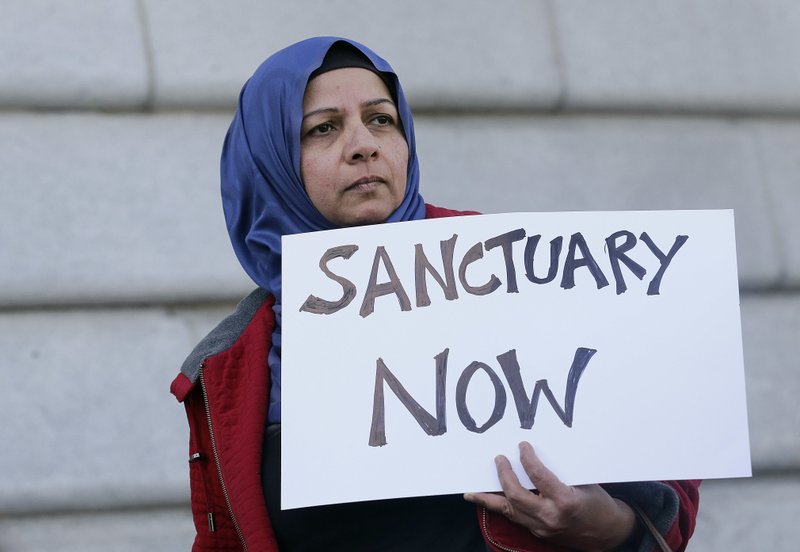
The Trump administration intensified its threats to crack down on so-called sanctuary cities that refuse to comply with federal immigration authorities, sending letters Friday to nine jurisdictions warning it would withhold coveted law enforcement grant money unless they document cooperation. The letters went to officials in California and in major cities including New York, Chicago, Philadelphia and New Orleans, all places the Justice Department‘s inspector general has identified as limiting the information local law enforcement can provide to federal immigration authorities about those in their custody. Attorney General Jeff Sessions has increasingly warned that the administration will punish communities that refuse to cooperate with efforts to find and deport immigrants in the country illegally. In a statement Friday, the Justice Department said the recipients of its letters are “crumbling under the weight of illegal immigration and violent crime.” After a raid led to the arrests of 11 MS-13 gang members in California’s Bay Area “city officials seemed more concerned with reassuring illegal immigrants that the raid was unrelated to immigration than with warning other MS-13 members that they were next,” the department said. The federal law in question says state and local governments may not prohibit police or sheriffs from sharing information about a person’s immigration status with federal authorities. Friday’s letters warn officials they must provide proof from an attorney that they are following the law or risk losing thousands of dollars in federal grant money that police agencies use to pay for anything from body cameras to bulletproof vests. The money could be withheld in the future, or terminated, if they fail to show proof, wrote Alan R. Hanson, acting head of the Office of Justice Programs, which administers the grant program, which is the leading source of federal justice funding to state and local communities. The targeted jurisdictions also include Clark County, Nevada; Cook County, Illinois; Miami-Dade County, Florida; and Milwaukee County, Wisconsin. They were highlighted in a May 2016 report by the Justice Department’s inspector general that found they have policies or rules that interfere with information-sharing among local law enforcement and immigration agents. The Orleans Parish Sheriff’s Office, for example, has a policy to decline all requests by Immigration and Customs Enforcement to keep a suspected deportable immigrant in its custody long enough for immigration authorities to arrest the person unless that person is charged with certain violent crimes, according to the report. It also pointed to a Miami-Dade County rule that allows its corrections department to honor detainer requests only if ICE agrees in writing to reimburse the county for costs and only if the inmate has a prior felony conviction, among other constraints. The Obama administration warned cities after the report’s release that they could miss out on grant money if they did not comply with the law, but it never actually withheld funds. The grants in question are based on population and support an array of programs, technology and equipment for local law enforcement agencies, which can use the money at their discretion. Sessions said earlier this week that sanctuary cities undermine efforts to fight violent gangs. Republished with permission of The Associated Press.
Mo Brooks joins House colleagues in leading effort to defund sanctuary cities
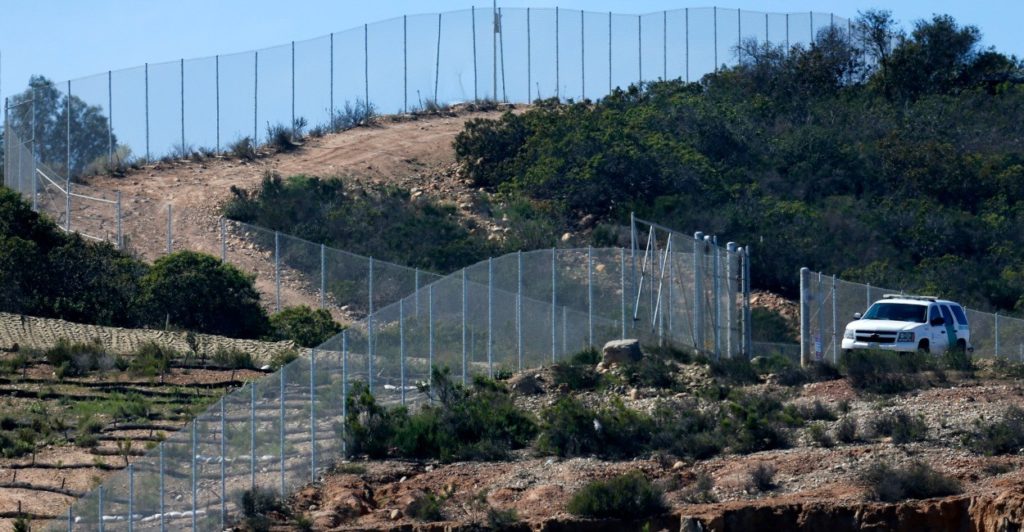
In an effort led by Alabama 5th District U.S. Rep. Mo Brooks, Arizona 4th District U.S. Rep. Paul Gosar, Iowa 4th District U.S. Rep. Steve King and Colorado 4th District U.S. Rep. Ken Buck — a group of House Republicans are urging Congressional appropriators to defund “sanctuary cities” that prevent law enforcement officials from faithfully executing America’s immigration laws: In a letter sent Tuesday, the four sponsors and 35 additional co-sponsors submitted appropriations language requesting the House Appropriations Committee prevent funds from going to “sanctuary cities.” “Sanctuary cities” are municipalities that have limited their cooperation with federal officials regarding undocumented immigrants, in order to help illegal immigrants avoid deportation. Currently, there are around 340 sanctuary jurisdictions across the U.S. actively obstructing federal law enforcement protecting illegal immigrants in sanctuary cities, according to a recent study by the Center for Immigration Studies. The letter follows an executive order President Donald Trump issued on his fifth day in office, whereby allowing Attorney General Jeff Sessions and Homeland Security Secretary John Kelly to decide whether sanctuary cities would be eligible for federal grants. “Congress has an opportunity to work with the Trump Administration and enforce our nation’s immigration laws with respect to sanctuary cities,” said Congressman Mo Brooks. “Cities and localities who have refused to comply with federal immigration laws and knowingly shield dangerous felons from removal by ICE present a clear danger to our Republic. According to an ICE report from March of 2017, there are an estimated 300 cities and counties obstructing federal immigration agents from doing their jobs to deport dangerous criminals, thereby intentionally endangering Americans.” Rep. Gosar points to the U.S. Constitution as the reason he and his colleagues are taking action. “The concept of ‘sanctuary city’ policies is in direct opposition to the Rule of Law and our Constitution. Article 1, Section 8, Clause 4, gives Congress clear jurisdiction on immigration matters,” stated Gosar. “I’m pleased to see President Trump and Attorney General Sessions lead on this issue, but the House must also act by using the power of the purse. It’s long past time for Congress to crack down and defund sanctuary city policies that are proven to be deadly and put the security of our communities at risk.” The House has voted and passed language that prohibits federal funds from going to sanctuary cities five different times in recent years. “Sanctuary cities force the federal government to spend more money on immigration enforcement,” added Rep. Buck. “We must assert federal authority on federal issues and cut off funding for cities that violate the rule of law, which is what this appropriations request does.” The full text of the appropriations language request can be found HERE. The list of 35 House members who cosponsored this language request include Representatives Abraham, Arrington, Babin, Barletta, Brady, Brat, Mo Brooks, Buck, Cramer, DeSantis, Duncan, Farenthold, Franks, Gosar, Grothman, Hensarling, Hice, Hunter, Sam Johnson, Jones, Kelly, Steve King, Lamborn, Marino, McCaul, McClintock, Meadows, Olson, Ratcliffe, Rooney, Rouzer, Schweikert, Wagner, Webster and Yoho.


